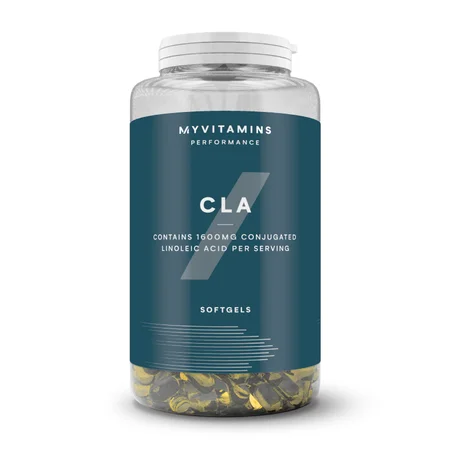What Is Conjugated Linoleic Acid (CLA)? | CLA For Weight Loss & CLA Benefits

If you’ve done some googling and found yourself down the rabbit hole of supplements, then you might be wondering, ‘what does CLA do?’. All these scientific terms can leave you feeling pretty confused about what they can actually do for you.
So, we’re here to crack the code and help you understand what CLA is, how it works, and how CLA may benefit you…
Whether you’re new to fitness or have been training for years one thing is always true — what you use to fuel your body has a major impact on the results you get. So, what about CLA?

What is CLA?
In broad terms, there are two main types of essential fats — omega 3
What are the benefits of CLA?
1. Fat burning potential
CLA is thought to help the body break down and burn more fat cells, as well as prevent excess fat storage. What’s seen in reality is that this process seems to happen mainly to the fat cells stored inside muscle tissue.
2. Enhanced muscle growth
More research needs to be carried out to show that this omega-6 supplement positively impacts lean muscle
3. CLA and immune function
When looking at how to make a conclusion based on the science available, a good place to start is to look at what the majority of the studies show. Is there a general trend, and if so, is it in favour of an effect or not?
CLA for weight loss
Some have theorised that CLA can change body composition and facilitate weight loss by altering the metabolism. Most of its effects on weight loss and changes in metabolism have only been observed in cells (in a test tube) or in animal studies.
Want more weight loss advice? Read this next:
CLA dosage and duration
There’s no general consensus as of yet for the dosage of this supplement, when to take it, and for how long. The studies show a big difference in dosages from as little as 0.7g/d to as much as 6.8g/d.
Sources of CLA
Now we’ve answered what CLA does, you might be wondering how you can get more through your diet. It can be found naturally in foods, or in the form of a man-made supplement. The most common food that you can find it in are meat and dairy.
CLA can be found in:
Beef Lamb Chicken Pork Cow’s milk Cottage cheese Cheddar cheese
Take home message
So, what does CLA do? Most people buy it for its potential weight loss properties. This supplement is claimed to aid muscle growth, lower cholesterol, improve blood glucose levels and support healthy immune function.
It is a dose-dependent supplement and has been used with as little as 0.7g/d up to 6.8g/d. The average use seems to be around 3g/d in supplement form for about 8 to 12 weeks.
FAQs
What is CLA?
A type of essential fatty acid, a subcategory of the omega 6 essential fatty acids.
What are the possible benefits of CLA?
It's been theorised to facilitate weight loss, aid muscle growth and lower cholesterol.
When should I take CLA?
There's no consensus on when is the best time to take CLA, however it is commonly taken with meals.
How much CLA should I take?
A common dosage is 3g per day.
What foods contain CLA?
Meats such as beef, lamb, chicken and pork or dairy products such as cow milk, cottage cheese and cheddar cheese.
READ THESE NEXT:

Claire is a Registered Dietitian through the Academy of Nutrition and Dietetics and a board-certified Health and Wellness Coach through the International Consortium for Health and Wellness Coaching. She has a Bachelor of Science in Biology and a Master’s degree in Clinical Dietetics and Nutrition from the University of Pittsburgh.
Talking and writing about food and fitness is at the heart of Claire’s ethos as she loves to use her experience to help others meet their health and wellness goals.
Claire is also a certified indoor cycling instructor and loves the mental and physical boost she gets from regular runs and yoga classes. When she’s not keeping fit herself, she’s cheering on her hometown’s sports teams in Pittsburgh, or cooking for her family in the kitchen.
Find out more about Claire’s experience here.






